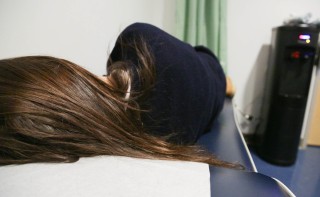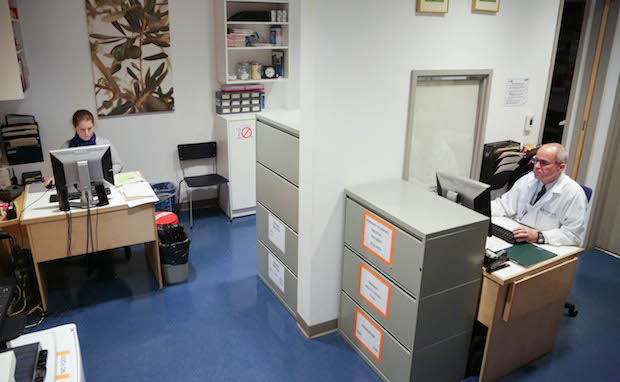“I’m so tired.” “I stayed up so late last night.” “I was falling asleep in class”… These are some complaints we hear in the nurse’s office, that place where many secondary students march in asking for a miraculous remedy, or more concretely, a place to take a nap.
A student takes a 10-minute nap in the nurse ‘s office on a Friday morning.
How many hours of sleep should a teenager get?
Sleeping is essential for our bodies, and particularly so for adolescents. According to the Baromètre Santé Jeune 2010 (Adolescent Health Data), some 30% of adolescents from 15 to 19 years of age lack sleep. And at age 15, 25% of adolescents sleep fewer than seven hours a night, and yet, most doctors recommend eight to ten hours of sleep each night for teenagers.
Sleep is considered critical for learning, acquiring knowledge, and maintaining physical and psychological balance during teenage years, and yet there are a number of factors that can disrupt a young person’s ability to get a good night’s sleep, and thereby their physical and psychological well-being.
Why sleep matters?
Sleep takes up a large part of our lives, because it’s vital to our development and balance.
First, sleep helps us rest and store energy. In children, growth hormones are secreted when they sleep, making it essential for the development and repair of tired muscles, skin and bones .
Sleep strengthens the immune system, and a lack of sleep can weaken a child’s defense system against infections, increasing the likelihood of sickness. In addition, studies show that our ability to eliminate toxins and blood sugar are weakened when one doesn’t get enough sleep, risking weight gain and diabetes later in life.
Does sleep have an impact on learning?
Sleep is vital for learning and memorization. Concretely, sleep helps maintain connections between neurons, strengthening memory. A lack of sleep has a direct impact on academic performance because it disrupts the attention and learning process. Many studies have demonstrated a drop in grades among students who don’t get enough sleep. To remember and process everything they learn in class, students must sleep! Sleep is essential in order for concentration, attention and alertness to work at their best. Students cannot concentrate in class, if the need for sleep is a overwhelming.
Finally, sleep plays a key role in student physical and psychological well-being. Sleep reduces our physical fatigue, and it also releases stress and tension, when we dream during REM sleep.
A lack of sleep brings about moody behavior and drowsiness. The risk of depression is higher in adolescents that go to sleep after midnight.
Why students don’t get enough sleep?
Some children suffer from serious sleeping problems that should be evaluated by a doctor. Though many of the examples below are experienced across a wide range of students, parents should be careful not to underestimate that there may be a serious medical problem, even if the causes of a child’s fatigue seem uncertain.
In addition to medical causes, which are very serious, there are several reasons why adolescents may be sleep-deprived:
– Staying up late forms part of a teenager’s routine. It’s one of the first ways children show opposition to parental authority. School activities demand an early schedule. When students don’t get to sleep until late at night and have to wake up early in the morning (particularly students who live far from school), they get less sleep.
– The use of electronics and audiovisuals in a student’s bedroom (smartphones, computers, video games, television) can also impact sleep time. Use of electronic devices can sometimes be unstructured, and without clearly defined time limits, use of these devices can take up a lot of time. Students (and adults) often don’t even notice how much time has passed! A lot of students effectively delay their bedtime this way, at the cost of their health and also of their schoolwork for the next day. In addition, light exposure from screens in the evening eliminates the production of melatonin, a hormone needed for sleep.
– An important homework assignment, too many after school activities that go on until late in the evening, lack of good time management and organizational skills all get in the way of sleep. It’s often a vicious cycle: the next day’s exhaustion might mean missing class or not fully grasping a lesson. Students then work double the amount of time needed to catch up, causing them to stay up late and creating more stress — all of which further reduce sleep.
What can parents and educators do to encourage sleep?
No doubt, parents worry when they see their children perpetually tired and complaining about not getting a good night’s sleep. When children go to bed late, night after night, for a host of reasons, the stress created between parents and children can bring up conflicts that further hurt sleep. We all know these conversations: “You’re not in bed yet!”, “Turn off the lights and sleep!”, “You’re not going to wake up tomorrow”, “Turn off your phone!”… These are understandable complaints that parents have, but they may well be colliding with a time in the evening when relaxation after a long active day is most important for child. What do to?
– Keep open dialogue, away from the moment of stress. The best way to address the issue is to discuss the problem directly with children, however, to do so outside of a stressful environment and not in the middle of a conflict. Parents could ask their children to try to find a solution.Sometimes, the simple fact of expressing our worries to our children, in the right moment, and in engaging them to find for themselves these solutions will let them balance the situation.
If you think the problem is serious and could be a medical issue, do visit a doctor. Otherwise, you might decide to ask them to turn off mobile phones at 8pm (yes, that’s possible!) or to set a bedtime of 9:30pm (even if students laugh at me when I suggest this time!). The point here is to give them the responsibility and teach them to set time limits for themselves and stick to them.
– Set a consistent sleep schedule. Work with your children to schedule a consistent time to wake up and go to sleep, even on the weekend and vacation. Why? Because the body gets used to one schedule, and constant changes in sleep schedules can cause greater fatigue, when they are back in school. You might try scheduling fixed times for dinner times, or “rituals” that will favor a good night’s sleep. Help students to be conscious of their own sleep rhythm and respect it (and go to sleep as soon as they sense signs of being tired, such as yawning, irritated eyes…)
– Avoid “energy” foods in the afternoon and evening. Make sure children avoid “energy” foods and beverages, such as coffee, tea, vitamin C, and caffeinated soda, or eating copious amounts of food during dinner late in the evening. It’s also preferable to avoid physical activities after 8pm.
– Set aside 8 hours+ a night. A good and simple solution is to calculate the time your child should go to sleep, based on when he or she needs to wake up. If your child must wake up at 6:30am to go to school, the ideal time for him or her to go to bed would be at 9:30pm (or even earlier if he or she is tired).
Routines are important to promote sleep, like drinking herbal tea.
– Make sleeping desirable! Many adolescents see sleeping as a waste of time that will stop them from doing other activities. The idea is to help them enjoy sleeping: a clean room, take time to do something enjoyable before bed: reading, decaffeinated herbal tea, warm bath at least 2 hours before bedtime, listen to calm music…
– Reduce screen and internet use late at night. Managing internet access and electronic device use is important, and if you can, before bad habits start! You could to talk to them and explain that new technologies are wonderful on many levels and they do make communication easier, they can also exhaust a lot of time. Children and teenagers are not yet conscious of the importance of their parent’s limits and controls. These are good habits for the entire family!
– Establish balance and rethink schedule. As parents and teachers, we have a huge responsibility in the rhythm that we impose on our children and students. This rhythm is not always easy to keep because of outside influences (homework to hand in before due date, dance and soccer games schedules vary from 6:00pm to 8:00pm). It is important to make choices depending on the children’s tolerance, their capacity to adapt, and also the acceptable limits concerning sleeping time.
It’s clear that a child who finishes a sports event at 8pm, gets home at 8:30pm and still has to have dinner, shower and do homework, will probably not sleep enough since he has to wake up for school at 6:30am. It is up to us then to re-evaluate the schedule and adapt day to day. If your children are having trouble prioritizing or managing their schedules and activities, we encourage them also to talk to their advisor.
– Lead by example. To open such discussion is also a good occasion for us to evaluate ourselves… Do we give a good example to our children? Do we know how to say “no” to our own smartphones, to our work, to television, to our tenth coffee…. the umpteenth time we’ve stayed up late? The temptations are numerous. We lead hectic lives and our environment changes so fast that the schedules that we live by are rarely followed. We also feel sometimes that sleep (not talking about rest!) is a “time stealer”. In fact, let’s not forget that our sleep is an integral part of lives, and if we forget to sleep, we won’t live to our fullest!
So, 9:30pm… does it make you laugh… or dream?
Good night!
The nurse office of the Lycée Français is opened every day from 8am to 5pm.
Additional reading:
Teens and sleep (National Sleep Foundation website)
Why is sleep important? (Department of Health website)
About the Author :
Anne-Sophie Deraison was previously the Secondary nurse at the Lycée Français de New York. Born in Paris, she earned a nursing degree in 2003 and started her career working in hospitals, first in pulmonary medicine at the Hôpital Cochin, then in the nephrology-dialysis unit at the Hôpital Européen Georges Pompidou.






